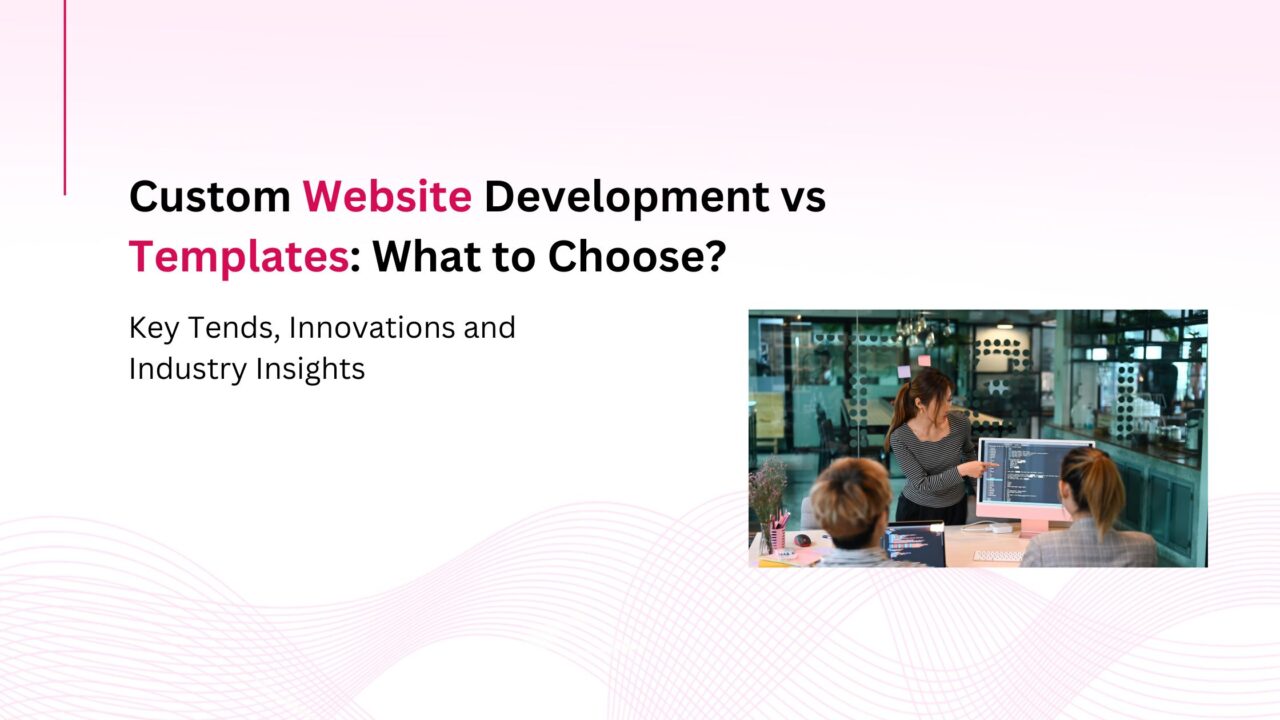Introduction: One Website Doesn’t Fit All
Your website is your digital identity. It’s where first impressions are formed, leads are generated, and brands come alive. In today’s competitive landscape, businesses can’t afford to blend in. And that’s where the debate of custom website development vs templates becomes critical.
While platforms like WordPress, Wix, and Shopify offer ready-made themes, they come with limitations. On the other hand, custom development offers a tailor-made solution—but at a higher cost and time investment.
So how do you choose?
If you’re a startup, entrepreneur, or SME, this decision can impact your branding, SEO, user experience, and scalability. In this guide, we’ll help you understand the key differences, benefits, and scenarios where one is better than the other. Let’s dive into the world of custom website development vs templates and discover which suits your business best.
Section 1: What Is Custom Website Development?
Custom website development is the process of building a website from scratch with unique code, design, and features tailored to your specific business goals. Unlike templates that force you to adapt, custom sites are designed to fit you.
Key Features of Custom Web Development:
- Unique User Experience (UX): Stand out with design built from your brand voice.
- Optimized for Performance: Clean code, faster load times, and better SEO.
- Built for Scale: Easily handle traffic spikes, integrations, and feature expansion.
- Secure and Compliant: Better protection from vulnerabilities and legal risks.
You get full control over:
- UI/UX design
- Technology stack (React, Angular, Laravel, Node.js, etc.)
- APIs and backend infrastructure
- Responsive behavior across devices
Section 2: What Are Website Templates?
Website templates are pre-built designs with drag-and-drop functionality that require minimal setup. They’re ideal for fast launches and simple use cases.
Benefits of Using Templates:
- Budget-friendly (often under ₹5,000 or even free)
- No need for advanced coding skills
- Quick launch time (within a day or two)
- Access to built-in design elements and widgets
However, templates are built for the masses. This means:
- Limited customization
- Slower performance due to bloated code
- Possible conflicts with plugins or third-party tools
- Difficult to scale as your business grows
Section 3: Custom Website Development vs Templates — In-Depth Comparison
| Feature | Custom Development | Templates |
| Design Flexibility | 100% unique design | Fixed layouts, limited customization |
| Cost | High initial investment | Low to moderate cost |
| Development Time | 4–12 weeks | 1–3 days |
| Performance Optimization | Optimized, lean code | Often bloated, impacts speed |
| SEO Potential | Advanced control over on-page SEO | Basic meta fields and plugins only |
| Security | Custom-built security layers | Shared codebase, more vulnerable |
| Maintenance | Developer-dependent | Easier for non-tech users |
| Best For | Long-term growth, branding, integrations | Simple sites, MVPs, short-term needs |
Section 4: When to Choose Custom Website Development
Investing in custom web development is a smart move when your business is:
1. Brand-Driven and Experience-Focused
If your brand image is a key differentiator (like luxury, fintech, or D2C), you need a site that reflects your values with precision.
2. Scaling Rapidly
Custom sites allow flexible architecture to add new features, languages, user roles, and backend systems as you grow.
3. In Need of Special Functionality
Whether it’s a complex search filter, customer dashboard, marketplace setup, or custom API integrations—templates can’t deliver this effectively.
4. Focused on SEO and Performance
Google rewards speed, clean HTML structure, and Core Web Vitals. A custom-coded website gives you that competitive SEO edge.
5. Aiming for High ROI
Think long term—custom sites reduce reliance on plugins, offer better uptime, and improve customer experience, leading to higher conversions.
Section 5: When Templates Are a Better Fit
Not every business needs to start with a custom solution. Templates are perfect for:
Use Cases:
- Landing pages or one-page event websites
- MVPs for testing product-market fit
- Freelancers or consultants showcasing portfolios
- Non-profits or local small businesses with limited budgets
When It Works:
- You don’t need complex integrations
- You have a tight timeline (under 3 days)
- Your focus is just to establish online presence
However, be prepared to switch or upgrade as your needs evolve.
Section 6: Red Flags — When It’s Time to Upgrade from a Template
If your current site is built on a template and you’re noticing these issues, it’s time to consider going custom:
- Your site looks too generic and lacks brand personality
- Plugin conflicts or broken layouts after updates
- High bounce rates and slow page loads
- Difficulties integrating with tools like CRM, analytics, or eCommerce platforms
- SEO efforts are not yielding results due to structural limitations
Section 7: Why Businesses Choose Cosnet for Custom Web Development
At Cosnet, we don’t just code websites—we build digital ecosystems aligned with your goals.
What Sets Us Apart:
- Strategy-first design and development process
- Performance and SEO optimization from Day 1
- Scalable, clean-coded architecture
- Integration with payment gateways, CRMs, marketing tools, and more
- Dedicated support and long-term maintenance
Whether you’re upgrading from a template or starting fresh, we create custom websites that grow with you.
Conclusion:
There’s no one-size-fits-all answer in the custom website development vs templates debate. If you’re looking for a fast, affordable way to go online, templates serve the purpose. But if you’re serious about performance, branding, and scalability, investing in a custom website will give you the edge you need.
Need expert guidance?
Let Cosnet help you evaluate what works best for your current phase and future vision.

